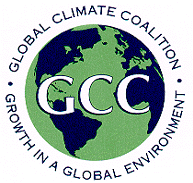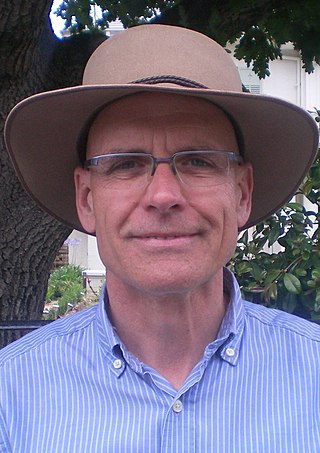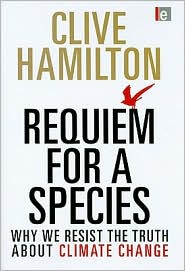
The Global Climate Coalition (GCC) (1989–2001) was an international lobbyist group of businesses that opposed action to reduce greenhouse gas emissions and engaged in climate change denial, publicly challenging the science behind global warming. The GCC was the largest industry group active in climate policy and the most prominent industry advocate in international climate negotiations. The GCC was involved in opposition to the Kyoto Protocol, and played a role in blocking ratification by the United States. The coalition knew it could not deny the scientific consensus, but sought to sow doubt over the scientific consensus on climate change and create manufactured controversy.

The Kyoto Protocol (Japanese: 京都議定書, Hepburn: Kyōto Giteisho) was an international treaty which extended the 1992 United Nations Framework Convention on Climate Change (UNFCCC) that commits state parties to reduce greenhouse gas emissions, based on the scientific consensus that global warming is occurring and that human-made CO2 emissions are driving it. The Kyoto Protocol was adopted in Kyoto, Japan, on 11 December 1997 and entered into force on 16 February 2005. There were 192 parties (Canada withdrew from the protocol, effective December 2012) to the Protocol in 2020.
The United Nations Framework Convention on Climate Change (UNFCCC) is an international treaty among countries to combat "dangerous human interference with the climate system", in part by stabilizing greenhouse gas concentrations in the atmosphere. It was signed in 1992 by 154 states at the United Nations Conference on Environment and Development (UNCED), informally known as the Earth Summit, held in Rio de Janeiro. Its secretariat was in Geneva at first but relocated to Bonn in 1996. The treaty entered into force on 21 March 1994. "UNFCCC" is also the name of the Secretariat charged with supporting the operation of the convention, with offices on the UN Campus in Bonn, Germany.

Clive Charles Hamilton AM FRSA is an Australian public intellectual currently serving as Professor of Public Ethics at the Centre for Applied Philosophy and Public Ethics (CAPPE) and the Vice-Chancellor's Chair in Public Ethics at Charles Sturt University. He is a member of the Board of the Climate Change Authority of the Australian Government, and is the Founder and former Executive Director of The Australia Institute. He regularly appears in the Australian media and contributes to public policy debates. Hamilton was granted the award of Member of the Order of Australia on 8 June 2009 for "service to public debate and policy development, particularly in the fields of climate change, sustainability and societal trends".
Friends of Science(FoS) is a non-profit advocacy organization based in Calgary, Alberta, Canada. The organization rejects the established scientific consensus that humans are largely responsible for the currently observed global warming. Rather, they propose that "the Sun is the main direct and indirect driver of climate change," not human activity. They argued against the Kyoto Protocol. The society was founded in 2002 and launched its website in October of that year. They are largely funded by the fossil fuel industry.
"Greenhouse Mafia" is the title of a TV program aired by Australian network ABC on the 13 February 2006 episode of its weekly current affairs program Four Corners. The program says the term greenhouse mafia is the "in house" name used by Australia’s carbon lobby for itself. The program featured former Liberal Party member Guy Pearse and Four Corners host Janine Cohen, while others concerned about the influence exerted by the fossil fuel lobby also participated. The report was based on a thesis Pearse wrote at the Australian National University between 1999 and 2005 regarding the response of Australian business to global warming. According to the program, lobby groups representing the coal, car, oil, and aluminium industries have wielded their power to prevent Australia from reducing its greenhouse gas emissions, which were already among the highest per capita in the world in 1990.

Hell and High Water: Global Warming – the Solution and the Politics – and What We Should Do is a book by author, scientist, and former U.S. Department of Energy official Joseph J. Romm, published December 26, 2006. The author is "one of the world's leading experts on clean energy, advanced vehicles, energy security, and greenhouse gas mitigation."
The Lavoisier Group is an Australian organisation formed by politicians and dominated by retired industrial businesspeople and engineers. It does not accept the science of global warming and works to influence attitudes of policy makers and politicians. The organisation downplays the risk of the effects of global warming, rejects the scientific conclusion that human activity causes it, and opposes policies designed to curtail it. Some members regard climate change as a "scam."
Post-Kyoto negotiations refers to high level talks attempting to address global warming by limiting greenhouse gas emissions. Generally part of the United Nations Framework Convention on Climate Change (UNFCCC), these talks concern the period after the first "commitment period" of the Kyoto Protocol, which expired at the end of 2012. Negotiations have been mandated by the adoption of the Bali Road Map and Decision 1/CP.13.
Ray Evans was an Australian businessperson, political conservative, and campaigner against climate change mitigation efforts.

The 2008 United Nations Climate Change Conference took place at PIF Congress Centre, Poznań International Fair (PIF), in Poznań, Poland, between December 1 and December 12, 2008. Representatives from over 180 countries attended along with observers from intergovernmental and nongovernmental organizations.
The climate change policy of the United States has major impacts on global climate change and global climate change mitigation. This is because the United States is the second largest emitter of greenhouse gasses in the world after China, and is among the countries with the highest greenhouse gas emissions per person in the world. In total, the United States has emitted over a trillion metric tons of greenhouse gasses, more than any country in the world.
Although it is a worldwide treaty, the Kyoto Protocol has received criticism.
The Kyoto Protocol was an international treaty which extended the 1992 United Nations Framework Convention on Climate Change. A number of governments across the world took a variety of actions.
The Kyoto Protocol was an international treaty which extended the 1992 United Nations Framework Convention on Climate Change.

Requiem for a Species: Why We Resist the Truth about Climate Change is a 2010 non-fiction book by Australian academic Clive Hamilton which explores climate change denial and its implications. It argues that climate change will bring about large-scale, harmful consequences for habitability for life on Earth including humans, which it is too late to prevent. Hamilton explores why politicians, corporations and the public deny or refuse to act on this reality. He invokes a variety of explanations, including wishful thinking, ideology, consumer culture and active lobbying by the fossil fuel industry. The book builds on the author's fifteen-year prior history of writing about these subjects, with previous books including Growth Fetish and Scorcher: The Dirty Politics of Climate Change.
The climate change policy of the United States under the presidency of George W. Bush differed from Bush's promises on the campaign trail to regulate carbon dioxide emissions from power plants: within two months of taking office he walked away from his commitment.
Ozone depletion and climate change, or Ozone hole global warming in more popular terms, are environmental challenges whose connections have been explored and which have been compared and contrasted, for example in terms of global regulation, in various studies and books.






